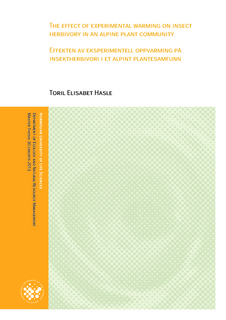| dc.description.abstract | Climate warming is predicted to affect species and trophic interactions worldwide, and alpine
ecosystems are expected to be especially sensitive to changes. There are few studies on how
insect herbivory respond to warming. Therefore, the aim of this study was to examine if
experimental warming had an effect on herbivory by leaf-chewing insects in an alpine plant
community. To manipulate the climate I used open-top chambers (OTCs) from an ongoing
long-term experiment at Finse, Norway. By recording feeding damages on the vascular plants
in the OTCs and in control plots, I found that warming increased the herbivory pressure on
Dryas octopetala, but not on Bistorta vivipara and Salix reticulata. The increase was
significant both in early and late season. Species-specific responses suggest that warming
might have caused changes in herbivore activity or plant quality. A feeding preference
experiment with the larvae of the moth Zygaena exulans, a common herbivore at the study
site, showed a strong dislike for Saussurea alpina. However, no significant difference
between the preference for D. octopetala, B. vivipara, S. reticulata, and S. herbacea was
found. There was little consistence between the feeding experiment and the field registrations.
This discrepancy might be caused by the presence of additional insect herbivore species in the
field or the fact that the feeding experiment was based on an introductory no-choice test. Even
with the limitations in using OTCs for herbivory research, the present study indicates that
some species, such as D. octopetala, will be more susceptible to insect herbivory than others
when temperatures increase. Although the impact of increased herbivory on plant
performance has not been assessed in this study, the increase in damages on D. octopetala
suggests that it is important to take insect herbivory into consideration when predicting
changes in alpine plant communities due to climate warming. | no_NO |
